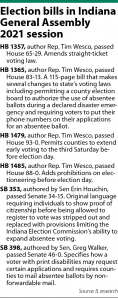Subscriber Benefit
As a subscriber you can listen to articles at work, in the car, or while you work out. Subscribe NowCompared to the battles surrounding voting bills in states such as Iowa and Georgia, the six bills that are moving through the Indiana General Assembly appear to be making rather mild tweaks to Hoosier election laws rather than attempting a controversial overhaul.
Yet the six measures are the ones that survived from a total of 15 that were introduced in the 2021 session. None of the bills authored by the Democrats received a hearing, and the amendments offered by the minority party have met stiff resistance from the Republican supermajority.

“Fortunately, we haven’t seen the assault on voting rights that a lot of other states have seen,” said Julia Vaughn, policy director for Common Cause Indiana. “… But we’re seeing a little bit of both here in Indiana, some small steps forward and some issues that give us cause for concern.”
House Bill 1479 is a bill that takes one of those small steps forward. Authored by Rep. Tim Wesco, R-Osceola, the measure would expand early voting to the third Saturday before election days. But, as Vaughn noted, the legislation only gives the option, rather creating a mandate, for counties to open the polls.
HB 1479 passed the Indiana House with a 93-0 vote. It has been referred to the Senate Elections Committee, which had scheduled the bill for a March 15 hearing.
Indiana’s bills are part of what many see as a “historic level” of voter legislation being introduced and debated in statehouses across the country, according to Jerrick Adams, staff writer for Ballotpedia. Adams noted 448 of those bills in some way address absentee voting policy, whether by making an extreme change or instituting a minor tweak.
Adams linked the deluge of legislation to the two dominant responses to the 2020 presidential election. Certain classes of the bills are attempting to make permanent the temporary expansions to absentee mail-in voting that were put in place to protect voters during the pandemic.

In the Indiana General Assembly, Senate Bill 117 is an example of that movement. Introduced by Sen. Frank Mrvan, D-Highland, the legislation would remove the state’s restrictions on absentee voting and permit any eligible voter to cast a mail-in ballot. The bill died in the Senate Rules and Legislative Procedure Committee.
Running counter to the expansion bills are measures that are in direct response to the allegations of fraud and misconduct that surround the November 2020 election.
This month, Iowa Gov. Kim Reynolds signed a bill that reflects that stance. According to the Des Moines Register, the legislation cut the state’s early voting period from 29 to 20 days, closed polls an hour earlier and tightened the deadlines for receipt of absentee ballots.
“There’s always this broader debate within election policy about balancing the impulse toward expansion of access, ease of access … with regulations, security and maintaining integrity,” Adams said. “I think what we’re seeing this year is just a very acute expression of that general tendency that dominated the (debate) for the last 20 years or so.”
Going to the courthouse
 During 2020, a flurry of litigation tried to expand voting access in Indiana by the November presidential election. All of the lawsuits that went to 7th Circuit Court of Appeals were blocked, but one has recently turned to the U.S. Supreme Court. The parties attempting to overturn Indiana’s restrictions on absentee voting by mail filed a petition for a writ of certiorari for the nine justices to hear their lawsuit, Tully v. Okeson, 20-2605.
During 2020, a flurry of litigation tried to expand voting access in Indiana by the November presidential election. All of the lawsuits that went to 7th Circuit Court of Appeals were blocked, but one has recently turned to the U.S. Supreme Court. The parties attempting to overturn Indiana’s restrictions on absentee voting by mail filed a petition for a writ of certiorari for the nine justices to hear their lawsuit, Tully v. Okeson, 20-2605.
Another case filed in 2017 and asserting Indiana’s method for purging voter rolls violates the National Voting Rights Act is in Chicago at the appellate court. The consolidated case, League of Women Voters of Indiana, et al. v. Connie Lawson, et al., 20-2815, and 20-2816, is scheduled for oral arguments April 22, 2021.
Senate Bill 398, authored by Columbus Republican Sen. Greg Walker, is a measure that includes both a provision adjusting the Indiana Code to conform to a ruling from a federal court and a provision that could bring a new round of election law litigation.
Through the bill, language will be amended into state law that reflects the outcome of Frederick v. Lawson, 1:19-cv-01959. Voters in South Bend successfully challenged Indiana’s practice of rejecting mail-in ballots without notification when a voter’s signature on the envelope was determined not to match that individual’s signature on file.
The Southern District of Indiana ruled the practice was unconstitutional, and the state did not appeal.
SB 398 establishes a process for curing the ballot. County election officials will have to set the mail-in ballot aside and contact the voter through mail, email and by phone when the signatures appear to be mismatched. The voter will then have until eight days after the election to file a signature verification affidavit. If the elections officials determine the signature on the affidavit matches the signature on the absentee ballot envelope, the vote will be counted.
Another provision would also extend the deadline for delivery of mail-in ballots from noon to 6 p.m. on Election Day. Vaughn pointed out the later deadline would be limited to only those counties that use electronic polls books.
“That means 21 counties and over half a million Hoosiers would still be operating under the noon deadline,” Vaughn said. “So that’s not only confusing, that creates an Equal Protection problem.”
SB 398 unanimously passed the Indiana Senate and has been referred to the House Elections and Apportionment Committee, where the bill was scheduled for a hearing March 16.
Adams sees an upside in that some recent competitive elections along with the actions in the state legislatures are drawing more attention from the general public. Where five years ago voters might not have been familiar with their state’s absentee voting laws, they are now more engaged and more attuned to the election process.
All that attention might cause some elected official to rethink their positions.
“In a democratic system, lawmakers are ultimately accountable to their electors,” Adams said. “So I think increased public attention, increased public sentiment about any given policy change, redistricting plan, whatever the case may be is certainly not something legislators can ignore altogether.”•
Please enable JavaScript to view this content.
